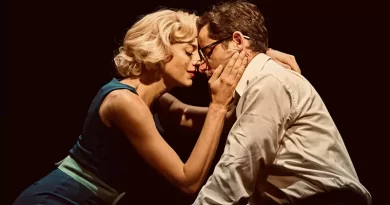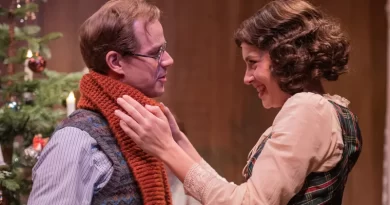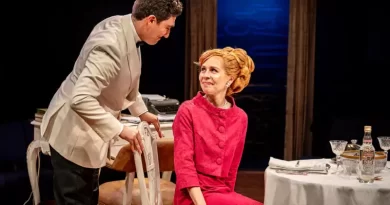“Top Girls”: Caryl Churchill at The National Theatre
Jeremy Malies on the South Bank
1 December 2018
There is theatre critic equivalent of locker room gossip suggesting that director Lyndsey Turner has a good channel of communication to playwright Caryl Churchill. I doubt this based on the current outing of Churchill’s landmark 1982 play Top Girls in the notoriously wide space that is the Lyttelton.
You have to assume that Turner would accept the general premise of the signature opening scene. The piece begins with ghastly employment agency executive Marlene (Katherine Kingsley) celebrating her appointment to the position of managing director of a recruitment company by hosting a dinner party in a swanky restaurant. There is something odd about her guests; they are all women from history, fiction or art. The diners include the explorer Isabella Bird (Siobhan Redmond excellent), Dulle Griet from the Bruegel painting (Ashley McGuire failing miserably to convey any of the physical comedy clearly indicated in the role) and Amanda Lawrence who excels with the liturgical language of the quasi-apocryphal medieval female Pope Joan.
However you spin the scene, the assumption surely is that with no friends of her own, Marlene is dreaming this, imagining it, or matters are in some way surreal, non-literal or fantastical. There must be a myriad of ways that a director can point the audience to such a realization even in this performance space whose aspect ratio makes many visitors think of a widescreen cinema. (The restaurant scene is in fact shrunk down by designer Ian MacNeil.) But if matters prove confusing and a profusion of jokes — many of them first-rate — consistently misfire then the evening has got off to a bad and perplexing start.
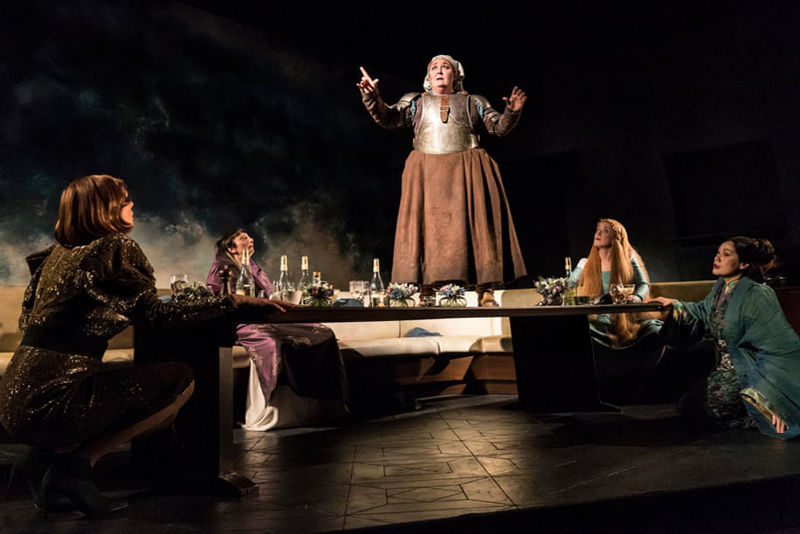
Ashley McGuire, standing, as Dull Gret.
Photo credit: Johan Persson.
The scene should have many changes of pace as the women reflect on their life histories, become raucous, drunken and euphoric. I even felt that Churchill’s dialogue innovations in which the characters interrupt each other, speak over one other and even pick up from a previous speech that has been halted by an interruption, had received little care from director and cast. You would need the hearing of a bat to make out every subtlety of this in the Lyttelton but even the overlapping and general cadence of the conversations seem lost. As the host, Kingsley shows no skill in martialing this when her character is nominally in control. Often inspired, an Olivier award winner for Chimerica and familiar with Churchill’s work from having directed Light Shining in Buckinghamshire, Lyndsey Turner seems pedestrian here.
As the power-dressed predatory Marlene however, Kingsley proves skillful later on in pointing out the subtleties of Churchill’s feminist position during the employment agency scene when we see the (exclusively female) job applicants being evaluated not as people but as money-making opportunities for commission should the agency be able to place them in a job. Many of the historical characters have been similarly objectified in a patriarchy but if the dinner party has misfired then the parallels are lost.
Having seen the agency, we move to a backwater of Suffolk where Marlene’s educationally-challenged teenage relative, Angie, is struggling at school and has a playmate many years younger than her. Again, MacNeil shrinks the set (this time into a small cube) to indicate the girls’ den or backyard and while this focuses attention, it still strikes me as clunky. Making her professional theatre debut, Liv Hill is outstanding as Angie. She has a body of screen work under her belt and even a best supporting actress TV Bafta but as a stage newcomer, it’s still remarkable that she can be so affecting as a gauche teen tomboy who is frightened and spirited by turns. In the subsequent scene, she follows her ‘auntie’ (massive hints are dropped that Marlene is in fact her mother) to London and the employment agency. No job for Angie there; she is assuredly not a ‘top girl’ save for her innate decency, and is likely to swell the dole queue in the era of privatization and union-bashing that is just around the corner under Margaret Thatcher.
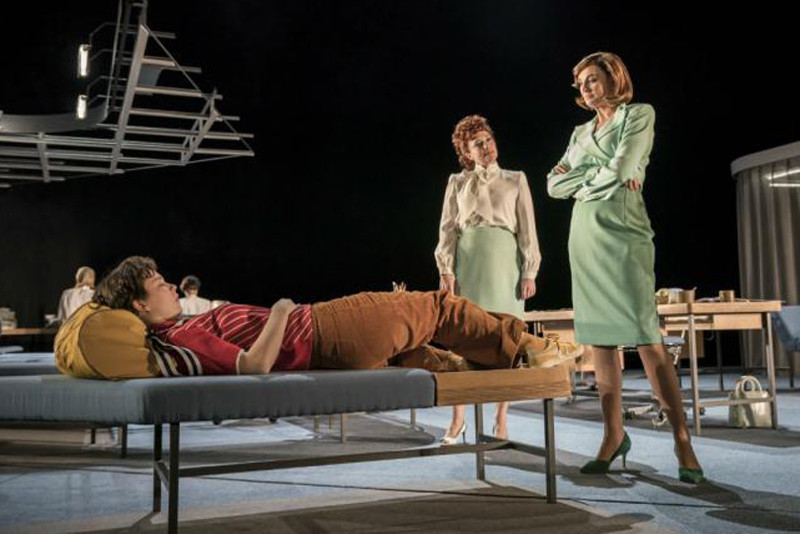
Liv Hill, Amanda Hadingue and Katherine Kingsley.
Photo credit: Johan Persson.
The final scene of prototypical sisterly kitchen-sink argument is bomb-proof and director-proof. It’s non-linear and takes us back in time to a year before the first scene in Suffolk. We learn more of Marlene’s sister Joyce, played by Lucy Black, who is compelling as she recounts bringing up Angie and miscarrying her own child in the process through stress. Joyce is scraping to make ends meet with four cleaning jobs and her feminism is part of a traditional socialist-minded compassion. By contrast, Marlene is barely a feminist at all though perhaps a bourgeois feminist who simply wants to thrive in the existing class system through hard graft and unusually sharp elbows.
The play remains massively relevant. Brexit will see a toughening of the UK labour market (EU employment legislation sides significantly with the worker) and as I type, three women (though hardly as fierce as Thatcher) are posturing for the Conservative leadership and thus the prime minister-ship. Some of my critic peers have baulked at the enormous cast of 18 since it’s normal to have only seven actors playing multiple roles. Thus, you might see the actor who has been the galivanting Isabella Bird playing stay-at-home Joyce or intellectual prodigy Pope Joan becoming the less than bright Angie. This can prove thought-provoking. I didn’t mind the single roles but simply wanted the actors to make a better fist of things. The production speaks to us through the play’s robustness and a few impressive performances but direction was off the pace and at times contrary to what I understand to be the author’s intentions.



